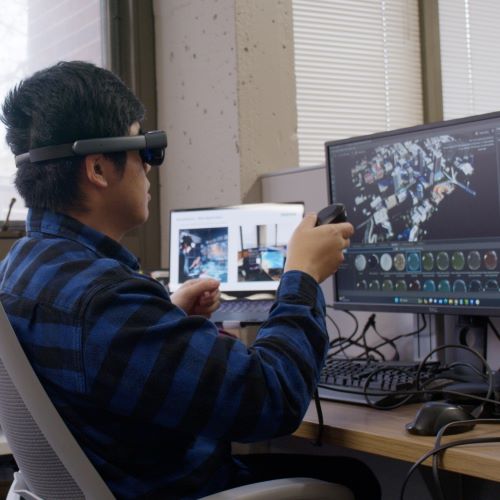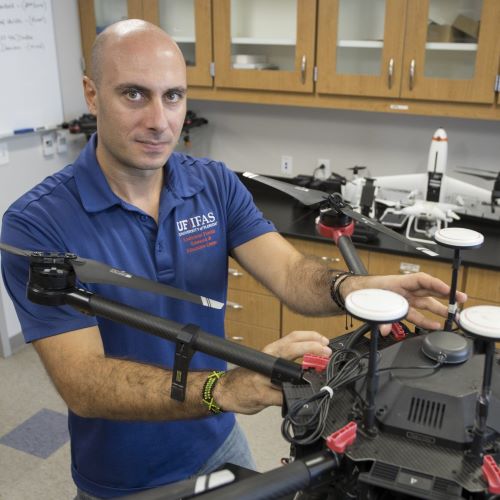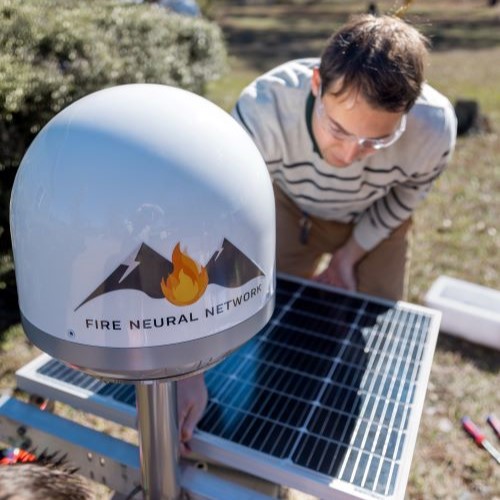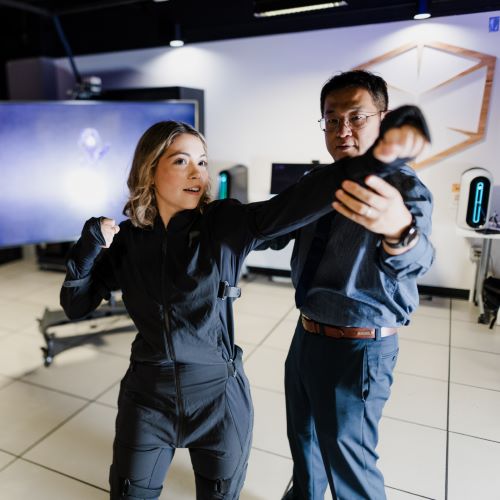July 16 is AI Appreciation Day, an opportunity to recognize the contributions artificial intelligence has made to our lives and to reflect on how we can steer AI to create a brighter future.
The University of Florida’s AI Across the Curriculum initiative has hired more than a hundred AI-focused faculty to bring the technology to every aspect of the university’s core missions of research, teaching and service. Today, we look at some of the AI innovations UF has ushered in.

Developing Florida’s digital twin
Last year, UF President Ben Sasse awarded $1.75 million in strategic funding from the Florida Legislature to build Florida’s digital twin. This innovative project aims to simulate every aspect of a city or region to help plan key infrastructure improvements that can grow the economy, improve citizens’ lives, and protect natural resources.
The project is led by Christine Angelini, Ph.D., director of the UF Center for Coastal Solutions. The pilot program will focus on Jacksonville and will prepare a digital twin that provides data-driven insights into buildings, roads and wastewater infrastructure. Florida’s digital twin relies heavily on HiPerGator, the fastest supercomputer in U.S. higher education, housed on the UF campus.

Helping physicians help their patients
Doctors have endless obligations, and paperwork is one thing standing between them and their patients. Enter GatorTronGPT, a tool developed in partnership with NVIDIA, that can generate doctors’ notes, freeing up valuable time for patient care.
GatorTronGPT uses AI to generate notes that are indistinguishable from those written by real physicians. The model was trained on more than 2 million anonymized health records from UF Health containing billions of medical terms. These records were also the basis for SynGatorTron, an AI model created by UF and NVIDIA that can producesynthetic patient data. Such synthetic data can assist with clinical trials and feed into other machine learning systems, all without having to access individual health records.

Rapid storm response
UF scientists are turning to AI to respond faster and smarter when hurricanes wreak havoc on crops. They are leveraging AI to assess damage to fruits and vegetables caused by extreme weather events based on technology developed by UF/IFAS Professor Yiannis Ampatzidis, Ph.D., that uses aerial and ground images to analyze fruit-tree characteristics such as their amount of fruit and overall health.
Now, with a new grant from the National Institute of Food and Agriculture, Ampatzidis will develop an AI model to analyze data captured by these tools to help automatically recognize damaged crops, fallen trees and ruined fruit after a storm. This kind of quick analysis can help farmers access insurance payments and keep supply chains intact following natural disasters.

Finding fires with lightning speed
As wildfires intensify, UF physicists and alums have launched Fire Neural Network, a company that uses AI to detect wildfires in just 40 seconds. The Gainesville-based company combines lightning detectors, environmental satellite data, and AI processing inspired by astrophysics to whittle the time it takes to identify wildfires from 24 hours down to less than a minute.
Lightning-ignited fires are the most common type of wildfire, and they are many times larger than those caused by humans. Having real-time, accurate information empowers fire and forest managers to respond quickly, safeguarding biodiversity, ecosystems, and communities.

Pathways for drug development
UF Professor of Chemistry Alberto Perez, Ph.D., and his team have developed an innovative AI pipeline based on Google’s AlphaFold that analyzes biological molecules to aid drug development. By using AI to simulate molecular interactions and analyzing thousands of chemicals, the pipeline predicts which potential drugs could best target proteins related to many human diseases. This analysis opens up avenues for treating conditions like inflammation, immune dysregulation and cancer.

National recognition
All this work has been recognized. The Tambellini Group awarded UF its inaugural Future Campus Award in June, praising UF’s AI Across the Curriculum program as “a uniquely detailed and pioneering strategy that provides myriad opportunities for any student, regardless of their major, to become AI literate and prepared to join an AI-enabled workforce.”
The Future Campus Award was created to honor colleges and universities that leverage AI to transform learning and research.